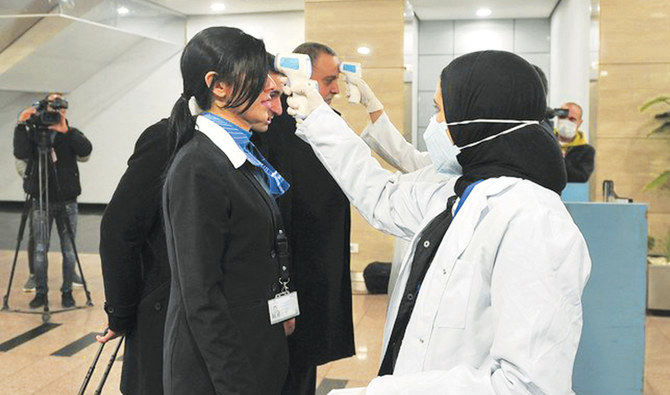CAIRO: Egypt has identified its first case of coronavirus, according to the Ministry of Health and Population (MOHP) and the World Health Organization (WHO).
The virus was discovered in a foreigner whose identity and nationality have not been officially disclosed. However, a source suggested that the individual was from China.
Meanwhile, France also reported the first fatality from the new coronavirus outside Asia on Saturday, as the death toll from the outbreak jumped past 1,500 in China. More than 66,000 people have now been infected in China from a virus that emerged in central Hubei province in December before spreading across the country and some two dozen countries.
Egypt, however, took all preventive measures in cooperation with WHO, said Media Adviser to Minister of Health Khaled Mugahed and added that the WHO was informed immediately of the case, as the patient was taken to hospital where he is in isolation and is having constant checkups. Mugahed said the patient had not shown any signs of deterioration and was “completely stable.”
He said the ministry had adopted strict preventive measures for those who came in contact with the patient by conducting the necessary tests, which came back negative.
People who came in contact with the patient were quarantined in their homes for 14 days as a precautionary measure.
Opinion
This section contains relevant reference points, placed in (Opinion field)
Those in isolation are being checked every eight hours and given instructions regarding their health. Among the preventive measures was the disinfection of the building in which the residents were living.
Mugahed said that the foreign patient tested positive for coronavirus even though he failed to show symptoms.
A source from the MOHP told Arab News that the foreign carrier of the virus is Chinese and was monitored during the past few days using periodic follow-up cards that are given to passengers at airports coming from abroad.
The source said the carrier of the virus was transferred to Al-Nujaila Hospital by ambulance. The carrier then went through further medical examinations.
A team from WHO is monitoring the patient’s condition. Official sources at the Ministry of Aviation confirmed that all precautionary measures have been taken at Cairo Airport.
John Gabor, a WHO representative in Egypt, praised the speed and transparency of the Egyptian government in dealing with the situation as well as its keenness to inform the organization of the patient as soon as it was suspected.
HIGHLIGHT
More than 66,000 people have now been infected in China from a virus that emerged in central Hubei province in December before spreading across the country and some two dozen countries.
Gabor stressed that Egypt was one of the first countries to develop a good preventive plan to address the emerging coronavirus and deal with infected cases once they are discovered.
Egypt’s Health Minister Hala Zayed held a meeting with the ministry’s leaders to follow up the implementation of the ministry’s plan to deal with the coronavirus.
Zayed added that results will be known after the 14-day incubation period of the virus.
WHO confirmed that a coronavirus carrier cannot be infected as long as the person does not show symptoms of the disease because it is possible that his immunity will overcome the virus before infection.
Zayed said the problem is not that a person is infected with the coronavirus and does not know it, but in the inability to manage the crisis in a way that prevents the spread of infection.
The minister said Egypt was fully prepared to deal with the epidemic and prevent its spread, and that there are other countries that are, up until now, not as well equipped.
The death toll from the virus has neared 1,400 cases, almost exclusively in China where it was first identified. It has infected more than 64,000 people globally.





























